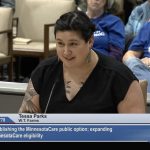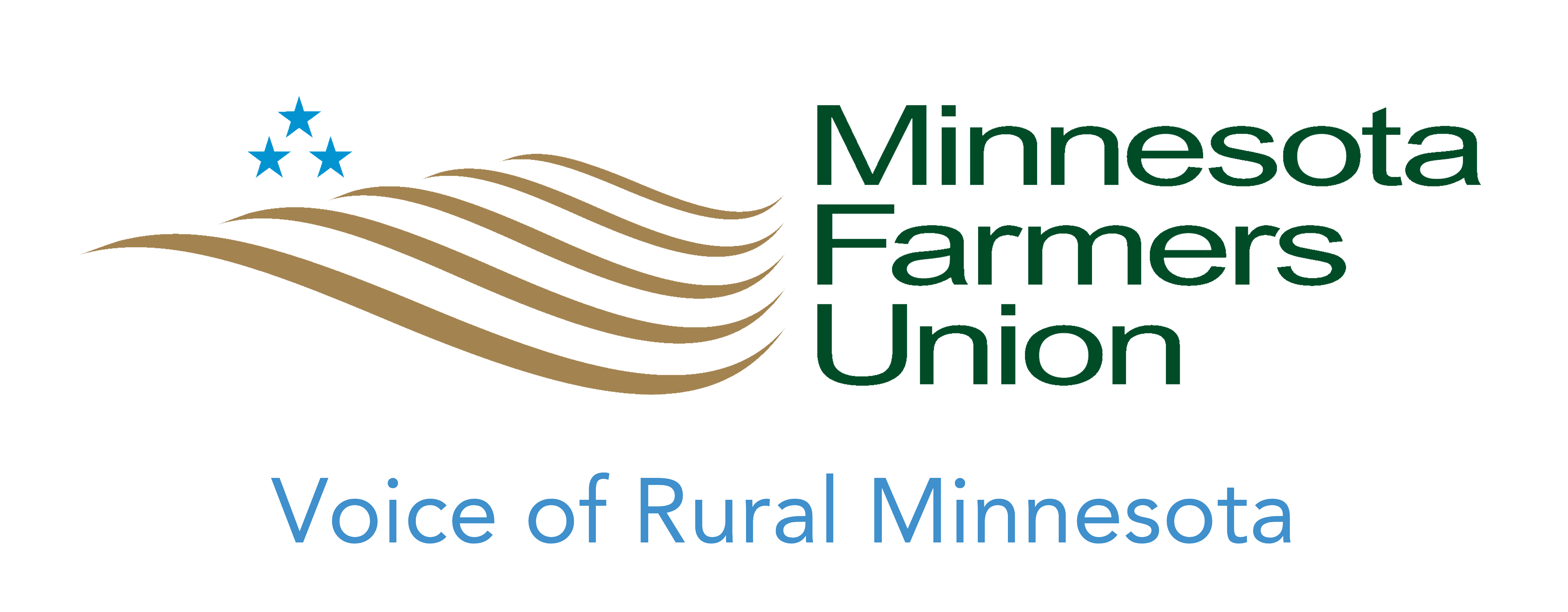Legislative Update: It’s deadline week at the Capitol
As of today, most legislative committees have just one or two committee hearings left to hear new proposals before committee deadlines on Friday, March 22.
Last week, the MinnesotaCare Public Option (SF4778/HF4745) earned first hearings in the House and Senate. MFU members Luke Sanders (Kandiyohi County) and Tessa Sadae Parks (Rice County) testified in support of the proposal, highlighting the impact high healthcare costs have on young families who are working to build their farm businesses.
“[This is] about people’s opportunity to build the life that they want to live,” said Sanders, as he addressed lawmakers before a crowded hearing room. “And if we want young families on the land, rural schools full of kids, and thriving communities, we need to figure out healthcare.”

Tessa Parks testifying.
“It’s also disheartening to think of the many young people who want to do something entrepreneurial in our state. Maybe they want to farm like me. Or start a welding shop to contribute to building new green energy projects, or start a rural veterinary practice, which we so desperately need,” Parks said as she addressed lawmakers the next morning in the Senate. “But they that can’t take that next step because they can’t afford to leave their employer-sponsored insurance. The status quo is a problem for me and it’s a big loss for our communities.”
Unique from many others, the MinnesotaCare Public Option proposal—led by Senate Health and Human Services Chair Melissa Wiklund, DFL-Bloomington, and Majority Leader Jamie Long, DFL-Minneapolis,—is a large finance bill and need not meet committee deadlines. Instead, and for the same reason, it will likely come down to budget negotiations between the governor and leadership in the House and Senate.
The MinnesotaCare Public Option proposal as it continues to move forward would allow farmers and others who are uninsured or purchase coverage on the individual market to ‘buy-in’ to quality, affordable coverage offered to lower income people through the state’s longstanding MinnesotaCare program.
Importantly, coverages would remain the same as in MinnesotaCare. For example, the plan would cover trips to the emergency room, doctor and clinic visits, hearing aids, dental, eyeglasses and a long list of other services all with limited cost sharing. Mental health or substance abuse visits, for example, don’t come with any copay, emergency room visits carry a $100 copay, and prescription drug costs to the patient are capped at $70 per month. Premiums would be graduated based on income as are limited deductibles, the latter of which are capped at $1,500 annually.
Minnesotans will also be able to continue relying on their existing insurance broker who will be compensated under the proposal for helping enroll people in quality coverage that works for their family.
Supplemental budget released
On related budget news, the governor released his supplemental budget recommendations. The are just that—recommendations—as the legislature needs to craft budget proposals and present it to the governor for his signature following passage. That said, it of course carries weight.
The governor did not include the funding necessary to move forward with a MinnesotaCare Public Option in his budget request. That said, he did address the proposal, including roughly $315,000 for studies and planning related to the Public Option.
The governor did however, include a funding request for $4 million to help backfill the Department of Agriculture’s (MDA) Agricultural Growth, Research, and Innovation (AGRI) program, a top priority for MFU and Chairs Aric Putnam, DFL-St. Cloud, and Samantha Vang, DFL-Brooklyn Center. This one-time funding does not completely fund the program to current levels, but it does allow MDA to maintain current program delivery and will help boost investments in dairy and meet processing.
Members give testimony
Last week, MFU Executive Committee member, Josh VanDerPol (Chippewa) again shared testimony about the broad impact of AGRI funding when Chair Putnam brought his proposal before the Senate Agriculture Committee.

Josh VanDerPol testifying.
“I connect with farmers in other states through my role with MFU and many are envious of the fantastic work happening in Minnesota,” VanDerPol said in his testimony, highlighting investments in Farm to School, biofuels infrastructure, meat processing, and other important programs. “So much of that is housed in AGRI.”
Also, from Chair Putnam, the Senate tax committee heard his bill to expand the ag homestead tax credit to farms less than 10 acres (SF4828). This is an issue MFU has worked on for years and committee members and Chair Ann Rest, DFL-New Hope, shared their support for their proposal.
Chisago County Farmers Union President Kelsey Love Zaavedra testified in support of the bill, saying “keeping farmland taxes affordable helps farmers stay on the land. Today I am speaking in support of this bill so that all farmers – no matter the size of their farm – can enjoy the benefits they deserve.”

Kelsey Love Zaavedra testifying.
MFU members Hannah Bernhardt (Pine County), Emily and John Beaton (St. Louis County), and Nikki Warner (Hennepin County) also submitted written testimony to the committee in support of the proposal. This expansion builds on the committee’s work to expand the ag homestead first tier valuation limit last year, a move MFU strongly supported.
On the House side, another bill was introduced to address nitrates in the southeastern part of the state. Rep. Kristi Pursell, DFL-Northfield, Rep. Bjorn Olson, R- Fairmont, and Rep. Larry Kraft, DFL- St. Louis Park, introduced a bill to set statewide goals for soil health practices including no-till and strip-till, cover cropping and precision nutrient management and also provide financial incentives for adoption of these practices (HF 4989). MFU’s Climate and Working Lands Program Director Ariel Kagan testified during the committee hearing of the bill.
“We held a series of listening sessions across the state to hear from farmers and rural communities about their thoughts on how to address climate change and make farms more resilient,” she said. “Unsurprisingly, market-driven and incentive based programs were high on the list.”

Ariel Kagan
Kagan also highlighted the need for technical assistance and more standard practices between state and federal programs. The bill was laid over, and the legislative team will continue working with the bill authors over the coming weeks to improve parts of the proposal.
At the intersection of competition and healthcare, MFU is supporting legislation that would strengthen rules governing health maintenance organization (HMO) conversions, which is where a nonprofit HMO transfers all or a substantial portion of its assets to a for-profit which is most commonly achieved through acquisitions (HF4853, SF4837). The legislation from Rep. Robert Bierman, DFL-Apple Valley, and Senate Health Finance Chair Melissa Wiklund, DFL-Bloomington, would protect nonprofit assets from being converted into private gain when the state’s moratorium on such conversions expires in 2026. This matters for Minnesotans and MFU’s policy, because the conversations take public healthcare investments and turn them into private profits, contributing to high healthcare costs. The bills are scheduled for several committee stops this week ahead of deadline.
As always, if you have any questions, thoughts, or concerns, about MFU’s legislative work, reach out to Stu at stu@mfu.org or (320) 232-3047 (C).
